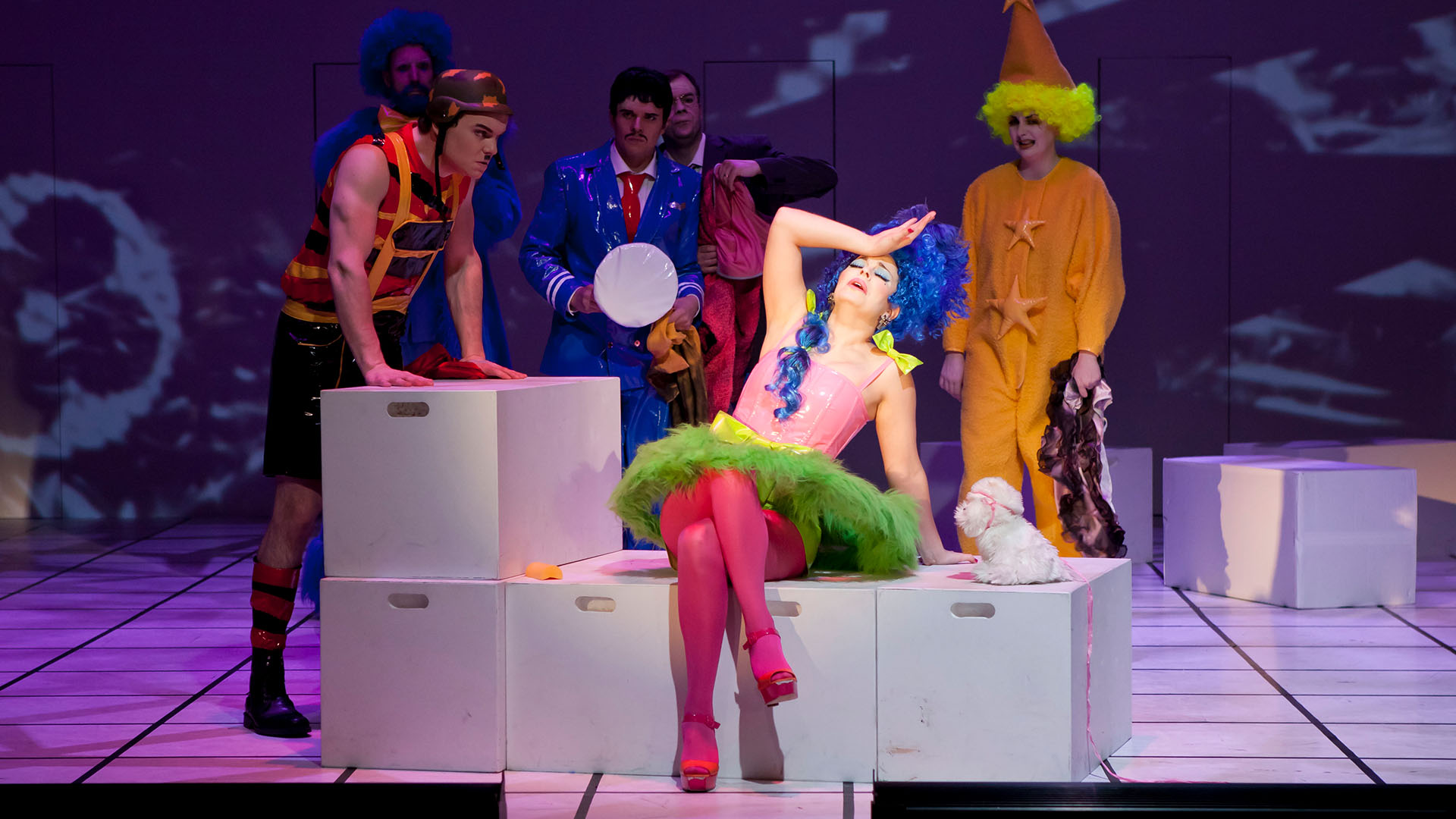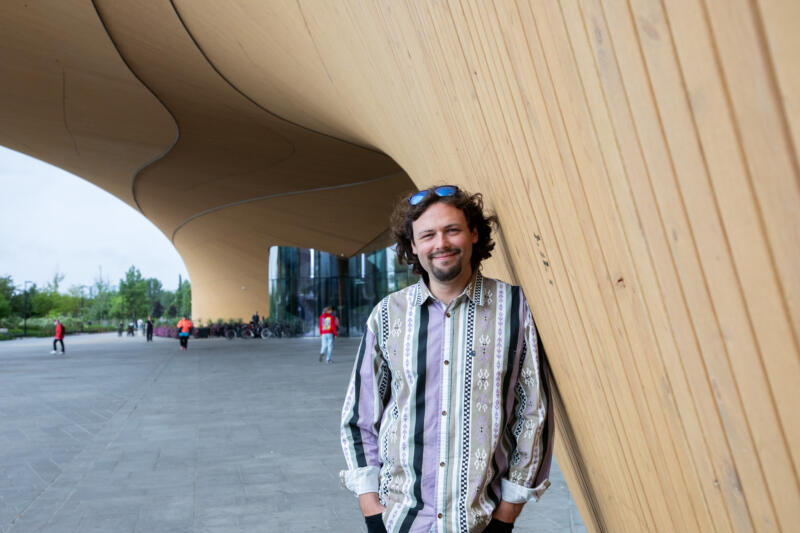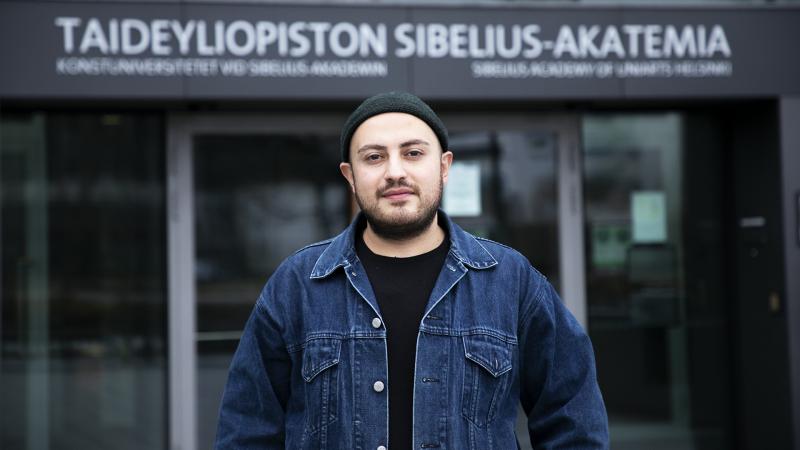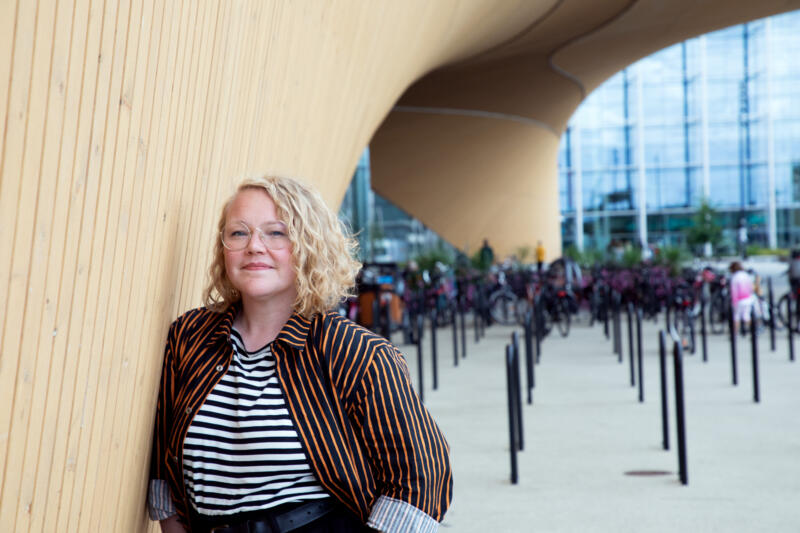Arts management, society and creative entrepreneurship, master
We provide new perspectives and approaches for the evolving fields of arts and culture.

Why choose us?
As a student in our master’s programme, you will be part of the acclaimed Finnish education system, gaining new perspectives on the evolving fields of arts and culture. In your daily life as a student, you will feel the care and attention we provide all students in our community. You will study in exceptional facilities and have tools to connect digitally with partners across the globe.
Our programme is international and taught in English. You will have the chance to meet and learn from world-class experts and academics from all over the world. Our students develop networks with colleagues and professionals in Finland and internationally. You will have a chance to work on student’s co-productions and festivals within Uniarts. You will have an opportunity to be part of highly relevant international projects and events. After graduation, you will have diverse work opportunities in leading positions in the public, private and third sectors. You will also be well prepared to work as an entrepreneur in the creative sector.
Content, objective and structure of the programme
Studies in arts management, society and creative entrepreneurship include major and elective modules.
After completing the master’s degree, the student has acquired theoretical concepts, insights and skills in arts and cultural management, along with critical perspectives in different fields of arts and culture, their values and impacts, cultural policy, cultural and creative industries, academic research methods, strategic management and leadership, entrepreneurship, cooperation as well as art, society and ecology. Moreover, students will be equipped with the practical skills and knowledge needed for a career in arts management, by providing them opportunities to “learn by doing”, working on the specific projects in the field, such as co-productions in field of theater, dance and music. We also give our students tools for personal professional development. You are able to tailor your study path according to your own interests and professional profile.
Degree studies includes 64 credits from the obligatory module’s courses and 30 credits from the Master thesis (94 credits in total). The 11 credits for elective subject module students can select from Arts management programme. Regarding the 15 credits for optional subjects, the students can select from Arts Management programme but also from other related study programmes. It is also an open platform where our students can learn through collaboration with other stakeholders from other departments from SIBA, other degree programmes within UNIARTS as well as with other Universities. All Courses are confirmed in the degree students’ personal study plans.
Study modules
Obligatory studies in arts management comprise three (3) modules.
The first two modules, Introductory level (Arts management, society and creative entrepreneurship) and Advanced level (Strategic management, leadership, audience engagement and branding) focus on the relation between art and society in large, creative entrepreneurship, including the values and impact of arts and culture as well as the general cultural policy frameworks. They include parts that are related to strategic management of arts organizations and leadership and creative industries and entrepreneurship.
The third module, Arts management research and methodologies module, introduces students to academic research theories, models and practices and provides support in writing a master’s thesis in Arts Management.
The fourth module, elective studies (11 credits), covers a wide range of topics, related to Arts management, society and creative entrepreneurship and is built upon concepts and practices examined in the Obligatory Modules enable students to pursue their theoretical and practical experience and interest in more detail. The elective module (11 credits) is built upon concepts and practices examined in the Obligatory Modules enable students to pursue their theoretical and practical experience and interest in more detail. All the elective studies should be selected from the Arts management department. Students can also earn credits by participating in professional projects, internships and work placements.
All the modules from the programme address the topic of sustainability, ecology and digitalization as cross cutting issues.
Optional studies and field trips
In addition to the elective module, we have Optional studies (15 credits).
Our students also have the opportunity to take courses from other departments within the Sibelius Academy, other Uniarts Helsinki faculties, and different universities. This 15 credits module is called optional studies.
An integral part of the study programme is a field trip that we organise to visit leading international arts organisations. It is usually aims for visits outside Finland, to a location chosen by the students. During the visit, students have the opportunity to meet, speak and share ideas with top-level arts managers and professionals.
Moreover, students will be equipped with the practical skills and knowledge needed for a career in arts management.
After graduating, students can work in leading positions in the fields of arts and culture. Our alumni work, for example, as producers and managers in art and research organisations. They are involved in cultural planning and policy, and even audience development. Many graduates also work as entrepreneurs.
Lecturers
The department head is responsible for the programme and the teaching staff are responsible for the supervision of master’s theses and dissertations. Top-level lecturers from Finland and abroad that are experts in their respective fields regularly visit the programme. These guest lecturers serve as vital links to working life and help students to broaden their professional networks during their studies. Below is a list of just some of the experts who have taught with us:
- Franco Bianchini (Professor, University of Hull, UK)
- Lidia Varbanova (Professor, National Academy of Theatre and Film Arts, Bulgaria)
- Taru Elfving (Uniarts Helsinki Academy of Fine Arts, Finland)
- Daniel Nordgård (Professor, University of Agder, Norway)
- Tero Nauha (Professor, Uniarts Helsinki Theatre Academy, Finland)
- Danielle Treacy (University Researcher, MuTri Doctoral School, Uniarts Helsinki)
- Arjo Klamer (Professor, Rotterdam University, Holland)
- Chris Keulemans (Art Director, Amsterdam, Holland)
- Timo Cantell (Head of Research Department, City of Helsinki, Finland)
- Sakarias Sokka (Cupore, Finland)
- Corina Suteu (Former Minister of Culture, Romania)
- Rachel Roberts (Eastman School of Music, USA)
- Aleksandr Brkic (Lecturer, Goldsmiths, University of London, UK)
- Francois Colbert (HÈC Montréal, Canada)
- Maria Hirvi-Ijäs (Cupore, Finland)
- Dennis Rich (Columbia College, Chicago, USA)
- Eero Tolppanen (Elements Music, Finland)
- Rodney Trapp (Harlem Dance Theatre, USA)
- Hannu Ojala (Aalto University, Finland)
- Kevin Kleinmann (Sorbonne University, France)
- Llúis Bonet (University of Barcelona, Spain)
- Milena Dragicevic Sesic (Serbia)
Professor
-
Toni-Matti Karjalainen
- Professor, arts management and entrepreneurship, MuTri Doctoral School, Sibelius Academy
- +358503574047
- toni-matti.karjalainen@uniarts.fi
Permanent staff
-
Violeta Simjanovska
- Head of department, lecturer Arts Management, Sibelius Academy
- +358505225094
- violeta.simjanovska@uniarts.fi
-
Jutta Aalto
- Coordinator, arts management and entrepreneurship, facilities, Academic affairs Sibelius Academy, Sibelius Academy
- +358505904715
- jutta.aalto@uniarts.fi
Information about applying
The programme admits approximately 15 new students every two years.
Bachelor’s degree holders who have some work experience in arts management can apply. The programme demands an adequate knowledge of the English language.
There are two separate selection groups for applicants:
- General selection group for all applicants
- Open University selection group (for those who have completed the required path studies at Uniarts Helsinki’s Open University).
Both selection groups have unique admissions criteria and therefore, they are not comparable. On the application form you must select which selection group you apply in. You can select only one group.
Bachelor’s programme in cultural music research
We have launched a new bachelor’s programme in cultural music studies at the Seinäjoki unit of Uniarts Helsinki. At the core of the programme is an effort to understand the multidimensionality of the music and culture industry and its social and ecological interactions. This programme is in Finnish.
Doctoral studies
A master’s degree in arts management, society and creative entrepreneurship qualifies students for doctoral studies. These studies focus on thorough empirical and interdisciplinary research in current arts management and leadership topics.
Programme background
The international and interdisciplinary arts management master’s programme was established in 1997 at the Sibelius Academy.
Already in 1991, Osmo Palonen, the founder of the master’s programme, started offering shorter courses on different topics for Finnish arts professionals. The visionary thinking of Palonen, alongside the brave decisions of the academy’s management, have brought us to where we are today.
At the beginning, the ideology behind the arts management master’s programme has been to produce arts management professionals who would bring artists, audience and society together in a meaningful way that enriches people’s lives.
The programme was a good match with the needs of the people who were working in the arts organisations in Finland at the beginning of 1990s. During that period, the government faced economic challenges, as the whole country was in a deep recession, and the public funds for arts and culture were decreased. All of this forced many of the art organisations, such as orchestras, museums and theatres, to re-think their old-fashion working habits. New skills in arts management were needed, including leadership, marketing, fundraising, sponsorship, entrepreneurship and many others.
In 1997, Palonen launched an international Arts Management Programme at Sibelius Academy, with top-level Finnish and international teachers and experts leading the courses. Palonen himself was leading the programme until 1999. Since then, the programme continued to evolve, adopting the main ideology of the role of arts managers up front: Bringing the artists, audience and society together in a meaningful way. The teaching activities have also expanded outside Helsinki. The department hosted a branch programme in Kuopio in 2004-2008, and in 2022, we co-established a pilot bachelor programme on cultural music research at the Seinäjoki branch of Sibelius Academy.
Throughout the years, the programme has been directed by a number of visionary people. In addition to Osmo Palonen, we want to acknowledge the great contributions to the legacy of the Arts Management Programme provided by the former Heads: Tuomas Auvinen (1999-2002), Samu Forsblom (2002-2003), Sanna-Mari Jäntti (2003-2004), Timo Cantell (2004-2010) and Tanja Johansson (formerly Tanja Vilén, 2011-2018), Patrick Furu and Kaisa Holopainen (in temporary posts 2014-2015), as well as Violeta Simjanovska current Head of Department (2018-ongoing).
Living in a turbulent time, when new conflicts are arising, climate change is threatening, the energy crisis, new economic challenges, and pandemics spread all over the world, – all of these tremendously affecting the fields of arts and culture, particularly the roles of individuals and operations of organisations. The crises have brought the sector into a state of great uncertainty and economic turmoil, which are predicted to have long-term negative effects on the arts. Many of the artists and arts organisations have sought new solutions in this situation, by transforming their earlier functioning practices and adopting new operation models. Most of the arts and cultural organisations across the world are in a process of re-thinking their management models, and new skills are needed in this process.
In 2019, we decided to start re-thinking and re-structuring the fundamentals of the Arts Management Programme. It was essential that teachers, experts, researchers, students, participants and practitioners of Arts Management come together to ponder the future together, trying to better understand our complex and unpredictable world. To back up the restructuring, we have made analyses of the needs of the Finnish society and, in particular, those of the arts organisations and individuals involved in the field. In addition, we took the global tendencies in the field into consideration. The crucial point in this process was our capability for adaptation and flexibility. We came up with the new understanding of Arts Management: Bringing the arts, artists and society together in a meaningful, inclusive, sustainable and responsible way – for us, that is what Arts Management is all about! We are paying particular attention to the core values, such as accessibly, freedom, inclusion, diversity, wellbeing, hospitality, equality and respect for nature. And as a bottom line, we are particularly dedicated to the wellbeing of our students, teachers and staff, and securing the best learning environment for everyone.
As the most visible result of this transformation, we started with a newly structured master’s degree programme titled “Arts Management, Society and Creative Entrepreneurship” in the Autumn of 2021, and from 2024, we will have a newly adjusted programme. With new content, we have tried to better adapt to the Finnish context, meet the needs of the cultural sector, but also to recognise and apply the global tendencies and relevant issues in the fields of arts and culture. As result, we are covering a wide spectrum of topics and themes: The role of arts, its value and impact in relation with society, cultural policy, cultural planning and urban regeneration, strategic management and leadership, creative industries, creative entrepreneurship, branding and marketing, popular culture, curating practices, music business, ecology, social justice and many more. As cross-cutting issues in all our courses, we are strongly addressing the aspects of sustainability and digitalisation. These aspects are not only covered in our curriculum, but we are also trying to show good practice by co-existing in a more meaningful and sustainable way ourselves.
The new bi-annual two-year programme is international and has a strong interdisciplinary approach. It is held in English, offers 120 credits, and our students are now graduating with the title of Master of Arts. Our students also have the opportunity to apply to doctoral studies in encompassing various theoretical, empirical and interdisciplinary research perspectives on relevant topics of Arts Management.
Our department is highly international. We have students from all over the world, and our top -level international teachers bring in concepts and practices from different corners of the world. In essence, the collaboration on the national and international levels is a key ingredient of our department. We have initiated many different projects, through which our students have an opportunity for international collaborative practices. We have also established collaboration in research projects with many universities and other stakeholders, and we are part of several cultural cooperation and community-based projects. In addition, the Arts Management Department has initiated collaborative projects within Uniarts Helsinki, bringing together students and teachers from all three academies.
We already have an alumni of more than 160 graduated students who work in well-known public art organisations in Finland and worldwide, in NGOs, collectives, private companies and start-ups, as researchers and entrepreneurs.
We do hope that we make a major contribution to the field of arts management through our master’s programme, our research as well as other activities. We hope to prepare arts managers of the future who are equipped to face and challenge the changing world: to contribute to the building of a more sustainable society and solving the key challenges concerning our future in the arts and cultural fields.
Get to know our everyday life
Target degree and length of study
Master of Arts
2 years
Application period
No admission in 2025. Next possible time to apply will be announced later.
Application languages
English
Read more about language skill requirements
Tuition fee
From August 2025, the annual tuition fee is € 12,000 for students who are studying in English and come from outside the EU and EEA countries.
Supervising teacher
-
Violeta Simjanovska
Head of department, lecturer Arts Management, Sibelius Academy+358505225094violeta.simjanovska@uniarts.fi
Unit
Sibelius Academy
Ask about applying
Why choose us?
As a student in our master’s programme, you will be part of the acclaimed Finnish education system, gaining new perspectives on the evolving fields of arts and culture. In your daily life as a student, you will feel the care and attention we provide all students in our community. You will study in exceptional facilities and have tools to connect digitally with partners across the globe.
Our programme is international and taught in English. You will have the chance to meet and learn from world-class experts and academics from all over the world. Our students develop networks with colleagues and professionals in Finland and internationally. You will have a chance to work on student’s co-productions and festivals within Uniarts. You will have an opportunity to be part of highly relevant international projects and events. After graduation, you will have diverse work opportunities in leading positions in the public, private and third sectors. You will also be well prepared to work as an entrepreneur in the creative sector.
Content, objective and structure of the programme
Studies in arts management, society and creative entrepreneurship include major and elective modules.
After completing the master’s degree, the student has acquired theoretical concepts, insights and skills in arts and cultural management, along with critical perspectives in different fields of arts and culture, their values and impacts, cultural policy, cultural and creative industries, academic research methods, strategic management and leadership, entrepreneurship, cooperation as well as art, society and ecology. Moreover, students will be equipped with the practical skills and knowledge needed for a career in arts management, by providing them opportunities to “learn by doing”, working on the specific projects in the field, such as co-productions in field of theater, dance and music. We also give our students tools for personal professional development. You are able to tailor your study path according to your own interests and professional profile.
Degree studies includes 64 credits from the obligatory module’s courses and 30 credits from the Master thesis (94 credits in total). The 11 credits for elective subject module students can select from Arts management programme. Regarding the 15 credits for optional subjects, the students can select from Arts Management programme but also from other related study programmes. It is also an open platform where our students can learn through collaboration with other stakeholders from other departments from SIBA, other degree programmes within UNIARTS as well as with other Universities. All Courses are confirmed in the degree students’ personal study plans.
Study modules
Obligatory studies in arts management comprise three (3) modules.
The first two modules, Introductory level (Arts management, society and creative entrepreneurship) and Advanced level (Strategic management, leadership, audience engagement and branding) focus on the relation between art and society in large, creative entrepreneurship, including the values and impact of arts and culture as well as the general cultural policy frameworks. They include parts that are related to strategic management of arts organizations and leadership and creative industries and entrepreneurship.
The third module, Arts management research and methodologies module, introduces students to academic research theories, models and practices and provides support in writing a master’s thesis in Arts Management.
The fourth module, elective studies (11 credits), covers a wide range of topics, related to Arts management, society and creative entrepreneurship and is built upon concepts and practices examined in the Obligatory Modules enable students to pursue their theoretical and practical experience and interest in more detail. The elective module (11 credits) is built upon concepts and practices examined in the Obligatory Modules enable students to pursue their theoretical and practical experience and interest in more detail. All the elective studies should be selected from the Arts management department. Students can also earn credits by participating in professional projects, internships and work placements.
All the modules from the programme address the topic of sustainability, ecology and digitalization as cross cutting issues.
Optional studies and field trips
In addition to the elective module, we have Optional studies (15 credits).
Our students also have the opportunity to take courses from other departments within the Sibelius Academy, other Uniarts Helsinki faculties, and different universities. This 15 credits module is called optional studies.
An integral part of the study programme is a field trip that we organise to visit leading international arts organisations. It is usually aims for visits outside Finland, to a location chosen by the students. During the visit, students have the opportunity to meet, speak and share ideas with top-level arts managers and professionals.
Moreover, students will be equipped with the practical skills and knowledge needed for a career in arts management.
After graduating, students can work in leading positions in the fields of arts and culture. Our alumni work, for example, as producers and managers in art and research organisations. They are involved in cultural planning and policy, and even audience development. Many graduates also work as entrepreneurs.
Lecturers
The department head is responsible for the programme and the teaching staff are responsible for the supervision of master’s theses and dissertations. Top-level lecturers from Finland and abroad that are experts in their respective fields regularly visit the programme. These guest lecturers serve as vital links to working life and help students to broaden their professional networks during their studies. Below is a list of just some of the experts who have taught with us:
- Franco Bianchini (Professor, University of Hull, UK)
- Lidia Varbanova (Professor, National Academy of Theatre and Film Arts, Bulgaria)
- Taru Elfving (Uniarts Helsinki Academy of Fine Arts, Finland)
- Daniel Nordgård (Professor, University of Agder, Norway)
- Tero Nauha (Professor, Uniarts Helsinki Theatre Academy, Finland)
- Danielle Treacy (University Researcher, MuTri Doctoral School, Uniarts Helsinki)
- Arjo Klamer (Professor, Rotterdam University, Holland)
- Chris Keulemans (Art Director, Amsterdam, Holland)
- Timo Cantell (Head of Research Department, City of Helsinki, Finland)
- Sakarias Sokka (Cupore, Finland)
- Corina Suteu (Former Minister of Culture, Romania)
- Rachel Roberts (Eastman School of Music, USA)
- Aleksandr Brkic (Lecturer, Goldsmiths, University of London, UK)
- Francois Colbert (HÈC Montréal, Canada)
- Maria Hirvi-Ijäs (Cupore, Finland)
- Dennis Rich (Columbia College, Chicago, USA)
- Eero Tolppanen (Elements Music, Finland)
- Rodney Trapp (Harlem Dance Theatre, USA)
- Hannu Ojala (Aalto University, Finland)
- Kevin Kleinmann (Sorbonne University, France)
- Llúis Bonet (University of Barcelona, Spain)
- Milena Dragicevic Sesic (Serbia)
Professor
-
Toni-Matti Karjalainen
- Professor, arts management and entrepreneurship, MuTri Doctoral School, Sibelius Academy
- +358503574047
- toni-matti.karjalainen@uniarts.fi
Permanent staff
-
Violeta Simjanovska
- Head of department, lecturer Arts Management, Sibelius Academy
- +358505225094
- violeta.simjanovska@uniarts.fi
-
Jutta Aalto
- Coordinator, arts management and entrepreneurship, facilities, Academic affairs Sibelius Academy, Sibelius Academy
- +358505904715
- jutta.aalto@uniarts.fi
Information about applying
The programme admits approximately 15 new students every two years.
Bachelor’s degree holders who have some work experience in arts management can apply. The programme demands an adequate knowledge of the English language.
There are two separate selection groups for applicants:
- General selection group for all applicants
- Open University selection group (for those who have completed the required path studies at Uniarts Helsinki’s Open University).
Both selection groups have unique admissions criteria and therefore, they are not comparable. On the application form you must select which selection group you apply in. You can select only one group.
Bachelor’s programme in cultural music research
We have launched a new bachelor’s programme in cultural music studies at the Seinäjoki unit of Uniarts Helsinki. At the core of the programme is an effort to understand the multidimensionality of the music and culture industry and its social and ecological interactions. This programme is in Finnish.
Doctoral studies
A master’s degree in arts management, society and creative entrepreneurship qualifies students for doctoral studies. These studies focus on thorough empirical and interdisciplinary research in current arts management and leadership topics.
Programme background
The international and interdisciplinary arts management master’s programme was established in 1997 at the Sibelius Academy.
Already in 1991, Osmo Palonen, the founder of the master’s programme, started offering shorter courses on different topics for Finnish arts professionals. The visionary thinking of Palonen, alongside the brave decisions of the academy’s management, have brought us to where we are today.
At the beginning, the ideology behind the arts management master’s programme has been to produce arts management professionals who would bring artists, audience and society together in a meaningful way that enriches people’s lives.
The programme was a good match with the needs of the people who were working in the arts organisations in Finland at the beginning of 1990s. During that period, the government faced economic challenges, as the whole country was in a deep recession, and the public funds for arts and culture were decreased. All of this forced many of the art organisations, such as orchestras, museums and theatres, to re-think their old-fashion working habits. New skills in arts management were needed, including leadership, marketing, fundraising, sponsorship, entrepreneurship and many others.
In 1997, Palonen launched an international Arts Management Programme at Sibelius Academy, with top-level Finnish and international teachers and experts leading the courses. Palonen himself was leading the programme until 1999. Since then, the programme continued to evolve, adopting the main ideology of the role of arts managers up front: Bringing the artists, audience and society together in a meaningful way. The teaching activities have also expanded outside Helsinki. The department hosted a branch programme in Kuopio in 2004-2008, and in 2022, we co-established a pilot bachelor programme on cultural music research at the Seinäjoki branch of Sibelius Academy.
Throughout the years, the programme has been directed by a number of visionary people. In addition to Osmo Palonen, we want to acknowledge the great contributions to the legacy of the Arts Management Programme provided by the former Heads: Tuomas Auvinen (1999-2002), Samu Forsblom (2002-2003), Sanna-Mari Jäntti (2003-2004), Timo Cantell (2004-2010) and Tanja Johansson (formerly Tanja Vilén, 2011-2018), Patrick Furu and Kaisa Holopainen (in temporary posts 2014-2015), as well as Violeta Simjanovska current Head of Department (2018-ongoing).
Living in a turbulent time, when new conflicts are arising, climate change is threatening, the energy crisis, new economic challenges, and pandemics spread all over the world, – all of these tremendously affecting the fields of arts and culture, particularly the roles of individuals and operations of organisations. The crises have brought the sector into a state of great uncertainty and economic turmoil, which are predicted to have long-term negative effects on the arts. Many of the artists and arts organisations have sought new solutions in this situation, by transforming their earlier functioning practices and adopting new operation models. Most of the arts and cultural organisations across the world are in a process of re-thinking their management models, and new skills are needed in this process.
In 2019, we decided to start re-thinking and re-structuring the fundamentals of the Arts Management Programme. It was essential that teachers, experts, researchers, students, participants and practitioners of Arts Management come together to ponder the future together, trying to better understand our complex and unpredictable world. To back up the restructuring, we have made analyses of the needs of the Finnish society and, in particular, those of the arts organisations and individuals involved in the field. In addition, we took the global tendencies in the field into consideration. The crucial point in this process was our capability for adaptation and flexibility. We came up with the new understanding of Arts Management: Bringing the arts, artists and society together in a meaningful, inclusive, sustainable and responsible way – for us, that is what Arts Management is all about! We are paying particular attention to the core values, such as accessibly, freedom, inclusion, diversity, wellbeing, hospitality, equality and respect for nature. And as a bottom line, we are particularly dedicated to the wellbeing of our students, teachers and staff, and securing the best learning environment for everyone.
As the most visible result of this transformation, we started with a newly structured master’s degree programme titled “Arts Management, Society and Creative Entrepreneurship” in the Autumn of 2021, and from 2024, we will have a newly adjusted programme. With new content, we have tried to better adapt to the Finnish context, meet the needs of the cultural sector, but also to recognise and apply the global tendencies and relevant issues in the fields of arts and culture. As result, we are covering a wide spectrum of topics and themes: The role of arts, its value and impact in relation with society, cultural policy, cultural planning and urban regeneration, strategic management and leadership, creative industries, creative entrepreneurship, branding and marketing, popular culture, curating practices, music business, ecology, social justice and many more. As cross-cutting issues in all our courses, we are strongly addressing the aspects of sustainability and digitalisation. These aspects are not only covered in our curriculum, but we are also trying to show good practice by co-existing in a more meaningful and sustainable way ourselves.
The new bi-annual two-year programme is international and has a strong interdisciplinary approach. It is held in English, offers 120 credits, and our students are now graduating with the title of Master of Arts. Our students also have the opportunity to apply to doctoral studies in encompassing various theoretical, empirical and interdisciplinary research perspectives on relevant topics of Arts Management.
Our department is highly international. We have students from all over the world, and our top -level international teachers bring in concepts and practices from different corners of the world. In essence, the collaboration on the national and international levels is a key ingredient of our department. We have initiated many different projects, through which our students have an opportunity for international collaborative practices. We have also established collaboration in research projects with many universities and other stakeholders, and we are part of several cultural cooperation and community-based projects. In addition, the Arts Management Department has initiated collaborative projects within Uniarts Helsinki, bringing together students and teachers from all three academies.
We already have an alumni of more than 160 graduated students who work in well-known public art organisations in Finland and worldwide, in NGOs, collectives, private companies and start-ups, as researchers and entrepreneurs.
We do hope that we make a major contribution to the field of arts management through our master’s programme, our research as well as other activities. We hope to prepare arts managers of the future who are equipped to face and challenge the changing world: to contribute to the building of a more sustainable society and solving the key challenges concerning our future in the arts and cultural fields.



